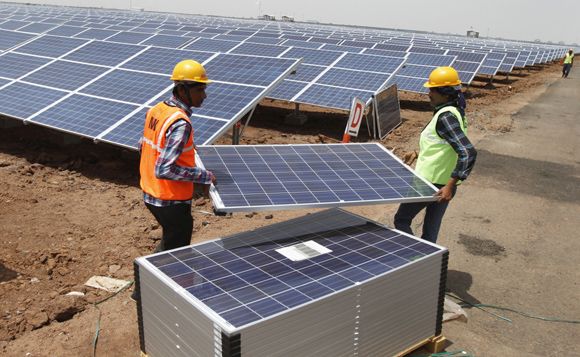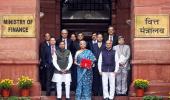Finance Minister Nirmala Sitharaman on Thursday said Pradhanmantri Suryodaya Yojana will enable one crore families to get up to 300 units of free electricity monthly and help them save up to Rs 18,000 annually.

"There is provision of Rs 10,000 crore for rooftop solar (scheme) in the Budget," said finance secretary T V Somanathan in press conference on Budget later in the day.
Earlier in the day Sitharaman in her interim Budget speech said through rooftop solarisation, one crore households will be enabled to obtain up to 300 units of free electricity each month.
This scheme follows the resolve of the prime minister on the historic day of consecration of the Ram Mandir in Ayodhya, she said.
Talking about the benefits, she informed the House that there will be "savings up to Rs 15,000-18,000 annually for households from free solar electricity and selling the surplus to the distribution companies".
Prime Minister Narendra Modi had announced the 'Pradhanmantri Suryodaya Yojana' with the target of installing rooftop solar earlier in January.
"I have taken my first decision after returning from Ayodhya that our government will launch 'Pradhan Mantri Suryoday Yojna' with the aim to install rooftop solar systems in one crore houses," Modi had said on X.
The scheme will also aid charging of electric vehicles; entrepreneurship opportunities for a large number of vendors for supply and installation and employment opportunities for the youth with technical skills in manufacturing, installation, and maintenance.
Talking about India's commitment for "net-zero" by 2070, she announced a Viability Gap Funding (VGF) for harnessing offshore wind energy.
"VGF will be provided for harnessing offshore wind energy potential for initial capacity of 1 GW," she said.
According to the Central Electricity Authority data, India has a solar energy-installed generation capacity of over 73 GW.
Similarly, the data showed that wind energy capacity in the country stood around 45 GW while large hydro (over 25 MW capacity each) is 47 GW.
The biomass power/cogen capacity about 10 GW and that of small hydro (up to 25 MW) is around 5 GW, while the waste-to-energy capacity stood at 583 MW.
India has set a target of having 500 GW of renewable energy by 2030 and have 50 per cent of installed power generation capacity from non-fossil fuel sources.
President Droupadi Murmu on Wednesday said in her joint address to the Members of Parliament that in 10 years, non-fossil fuel-based energy capacity has increased from 81 GW to 188 GW.
"During this period, solar power capacity has increased 26 times.
"Similarly, wind power capacity has doubled.
"We are placed at fourth in the world in terms of renewable energy installed capacity.
"We are ranked fourth in wind power capacity.
"We are at fifth position in solar power capacity," she said.
Ashwani Sehgal, president of Indian Solar Manufacturers' Association and MD of Alpex Solar, said, "It's a very positive step that the government announced in its interim Budget that 1 crore homes would get solar panel installation."
This offers a robust 30 GW opportunity and has massive upside for solar manufacturers, he pointed out.
"This announcement by our finance minister is a big welcome and game changer for solar manufacturers, environment, local job creation and shall take solar panels to all nooks and corners of Bharat," he added.
Anujesh Dwivedi, partner, Deloitte India, said, "Empowering one crore households with rooftop solar installations, delivering up to 300 free units monthly, signifies a transformative synergy for the power sector."
This initiative not only advances renewable energy capacity installation in the country but also addresses the chronic issue of poor financial viability and subsidy dependence of DISCOMs, marking a significant stride towards sustainability and economic efficiency, Dwivedi said.
By fostering a widespread adoption of rooftop solar, this initiative not only enhances environmental sustainability but also empowers households, contributing to energy self-sufficiency and fostering a more resilient and decentralised power infrastructure for the nation, Dwivedi added.
On VGF for offshore wind, Dwivedi said the timely announcement of VGF for a 1 GW offshore wind capacity is a strategic move, "aligning with our national ambition to achieve 500 GW of installed capacity from non-fossil fuel sources by 2030".
Essar Power CEO Kush Singh said, "The government's commitment to providing free rooftop solar electricity to one crore households signifies a strategic move towards resource-efficient economic growth.
"This initiative not only ensures energy security but also stimulates entrepreneurship and employment in the evolving renewable energy landscape."
ReNew Founder Chairman and CEO Sumant Sinha said continued priority to achieve rapid growth of the green energy sector is clear.
Announcements on VGF for offshore wind energy and allocations for solar rooftop projects will support development of the whole industry, he said.
The announcement of Rs 1 lakh crore corpus for research and development in sunrise sectors sets a positive tone for the future, encouraging us to accelerate our investments and innovations in renewable energy technologies, he said.











 © 2025
© 2025